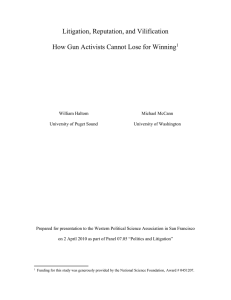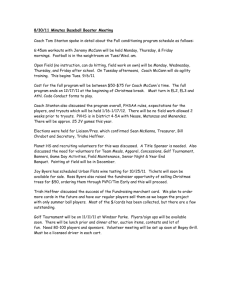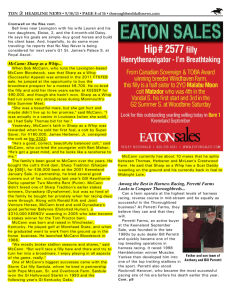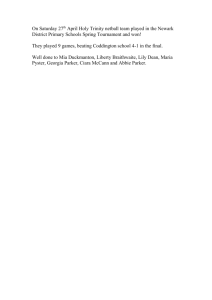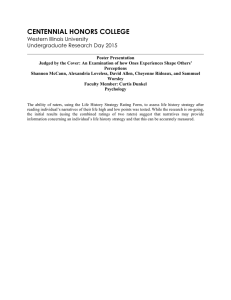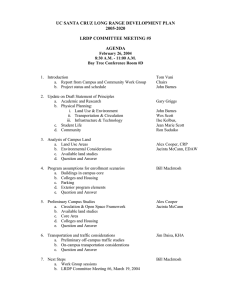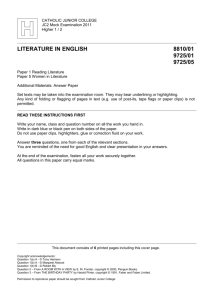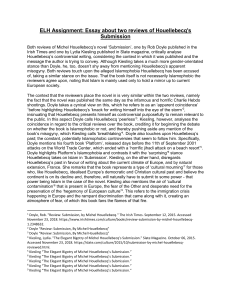H-France Review Page 1 Michel Houellebecq: Author of our Times
advertisement
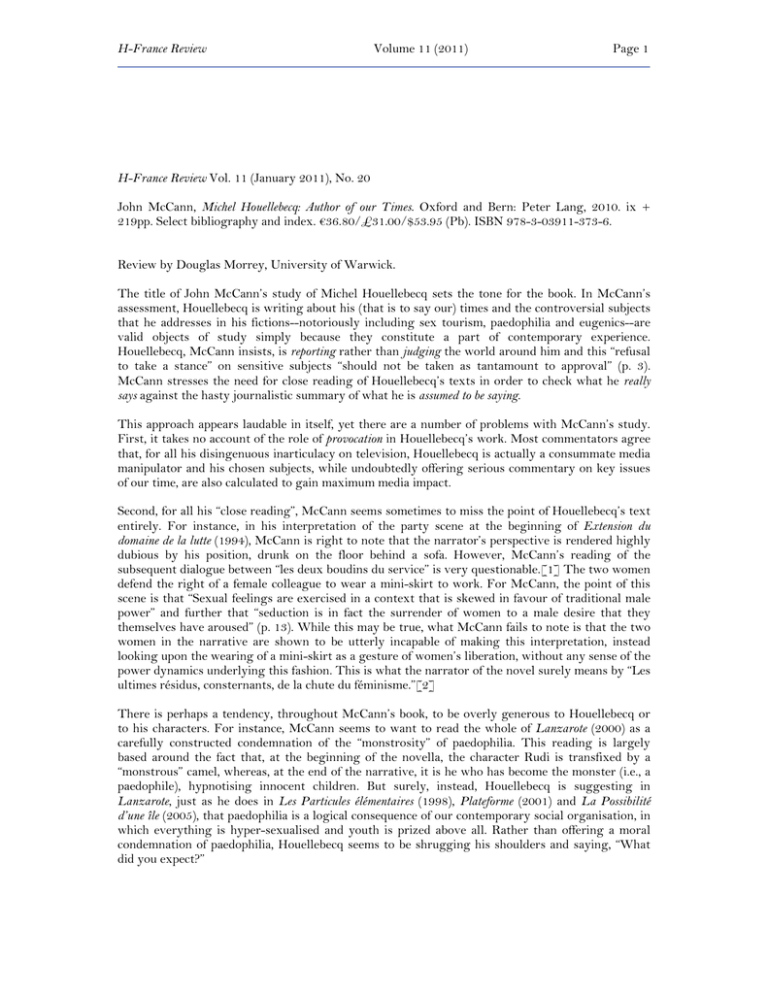
H-France Review Volume 11 (2011) Page 1 H-France Review Vol. 11 (January 2011), No. 20 John McCann, Michel Houellebecq: Author of our Times. Oxford and Bern: Peter Lang, 2010. ix + 219pp. Select bibliography and index. €36.80/£31.00/$53.95 (Pb). ISBN 978-3-03911-373-6. Review by Douglas Morrey, University of Warwick. The title of John McCann’s study of Michel Houellebecq sets the tone for the book. In McCann’s assessment, Houellebecq is writing about his (that is to say our) times and the controversial subjects that he addresses in his fictions--notoriously including sex tourism, paedophilia and eugenics--are valid objects of study simply because they constitute a part of contemporary experience. Houellebecq, McCann insists, is reporting rather than judging the world around him and this “refusal to take a stance” on sensitive subjects “should not be taken as tantamount to approval” (p. 3). McCann stresses the need for close reading of Houellebecq’s texts in order to check what he really says against the hasty journalistic summary of what he is assumed to be saying. This approach appears laudable in itself, yet there are a number of problems with McCann’s study. First, it takes no account of the role of provocation in Houellebecq’s work. Most commentators agree that, for all his disingenuous inarticulacy on television, Houellebecq is actually a consummate media manipulator and his chosen subjects, while undoubtedly offering serious commentary on key issues of our time, are also calculated to gain maximum media impact. Second, for all his “close reading”, McCann seems sometimes to miss the point of Houellebecq’s text entirely. For instance, in his interpretation of the party scene at the beginning of Extension du domaine de la lutte (1994), McCann is right to note that the narrator’s perspective is rendered highly dubious by his position, drunk on the floor behind a sofa. However, McCann’s reading of the subsequent dialogue between “les deux boudins du service” is very questionable.[1] The two women defend the right of a female colleague to wear a mini-skirt to work. For McCann, the point of this scene is that “Sexual feelings are exercised in a context that is skewed in favour of traditional male power” and further that “seduction is in fact the surrender of women to a male desire that they themselves have aroused” (p. 13). While this may be true, what McCann fails to note is that the two women in the narrative are shown to be utterly incapable of making this interpretation, instead looking upon the wearing of a mini-skirt as a gesture of women’s liberation, without any sense of the power dynamics underlying this fashion. This is what the narrator of the novel surely means by “Les ultimes résidus, consternants, de la chute du féminisme.”[2] There is perhaps a tendency, throughout McCann’s book, to be overly generous to Houellebecq or to his characters. For instance, McCann seems to want to read the whole of Lanzarote (2000) as a carefully constructed condemnation of the “monstrosity” of paedophilia. This reading is largely based around the fact that, at the beginning of the novella, the character Rudi is transfixed by a “monstrous” camel, whereas, at the end of the narrative, it is he who has become the monster (i.e., a paedophile), hypnotising innocent children. But surely, instead, Houellebecq is suggesting in Lanzarote, just as he does in Les Particules élémentaires (1998), Plateforme (2001) and La Possibilité d’une île (2005), that paedophilia is a logical consequence of our contemporary social organisation, in which everything is hyper-sexualised and youth is prized above all. Rather than offering a moral condemnation of paedophilia, Houellebecq seems to be shrugging his shoulders and saying, “What did you expect?” H-France Review Volume 11 (2011) Page 2 McCann makes, nonetheless, a number of astute points during the course of his book. In his first chapter, he remarks that Houellebecq is “derivative” in the best sense of the word, that is, Houellebecq “reminds us that what we encounter is not created out of nothing but always comes from somewhere” (p. 5). For McCann this explains the fact that, despite Houellebecq’s taste for science-fiction narratives, both he and his characters tend always to be more interested in the past than in the future, in derivation rather than descent. He adds, intriguingly, that this can also explain why Houellebecq routinely has more sympathy for the elderly--because they are our progenitors-than for children, who represent our future. He remarks, finally, that this consuming obsession with the past finds its most complete expression in the clones of La Possibilité d’une île, whose entire lives are devoted to reading and re-reading the life history of their predecessor, thereby ironically achieving the aspiration of Extension’s narrator: “une vie entière à lire.” [3] McCann is also attentive to the ways in which Houellebecq employs traditional literary symbolism-an aspect of his writing perhaps over-looked in the rush to account for his novelty. McCann notes the importance of images of water and bathing in Les Particules élémentaires, with their cleansing, purifying associations, as when Bruno meets his love Christiane in a Jacuzzi. This imagery finds its negative corollary in the scenes of bullying in young Bruno’s boarding school, when his head is forced into the toilet in a cruel “parody of baptism” (p. 62). Similarly, although countless critics have quoted the line from La Possibilité d’une île: “Le jour du suicide de mon fils, je me suis fait des œufs à la tomate”[4] as indicative of the absence of filial feeling in Houellebecq, McCann is the first, to my mind, to have taken seriously the metaphorical significance of these food references: “The physical hunger that has to be satisfied is indicative that at some level he [Daniel] is aware of emptiness, a hole at the centre of his existence” (p. 189). A final point in McCann’s favour is that he reads the considerable scientific research present in Les Particules élémentaires and La Possibilité d’une île more closely than most commentators and he shows to what extent Houellebecq, in these novels, understands and demonstrates how science works, that is to say in fits and starts, with partial, temporary solutions to problems that will later be improved upon by others. Elsewhere, however, McCann’s interpretation seems rather inadequate. For instance, his main observation about Les Particules élémentaires--Houellebecq’s best-known work--is one of multiplicity: the novel documents the multiplicity of forces (cultural, genetic, etc.) shaping our lives, while also generating a multiplicity of different points of view and potential readings of the text, all of which are contained within, but often deceptively smoothed over by the apparently unremarkable surface of Houellebecq’s writing. Now this is undoubtedly true, but couldn’t much the same point be made about almost any successful novel? Certainly all of the great novelists of the nineteenth century, many of whom Houellebecq cites as models, sought to do something very similar. Moreover, this insistence on multiplicity bespeaks a certain refusal to interpret that sometimes mars McCann’s text. For instance, he cites a variety of possible symbolic and sociological readings for the racialized urban violence that punctuates Plateforme, but the reluctance to accord priority, based on textual evidence, to any one of this “host of interpretative possibilities” (p. 164) is ultimately rather disappointing. The book, finally, is divided between a rather deficient analysis of Houellebecq’s central themes and ideas and a certain tendency toward over-reading minor textual details. In places, this veers toward the unintentionally comic as when McCann interprets Christiane’s erotic act of rubbing Bruno’s semen into her breasts as a metaphor for the reading encounter: “Reading is like sex--particularly like the act described above. Both parties (reader and authorial text, Bruno and Christiane) bring different individual experiences to the act. The reader’s interpretation is not a penetration of the mystery of the text but something that originates in the reader as a response to the text and which can be spread over the text and absorbed into it” (p. 60). Reading this paragraph, one is obliged to wonder whether McCann is making a joke at his own and the reader’s expense. It is a little reminiscent of the moment in Plateforme when Michel, reading a sex scene in a popular novel, ejaculates between the pages so that they stick together. Michel is philosophical: “ce n’était pas un livre à lire deux fois.”[5] If Houellebecq is encouraging his readers to see his own novel as a book to H-France Review Volume 11 (2011) Page 3 jerk off to, is McCann comparing his own interpretative efforts to a rather sordid smearing of sperm? Despite momentary pleasures like these, McCann’s book ultimately disappoints in large part due to its lack of rigour. There are factual errors: one of Houellebecq’s first interpreters, Dominique Noguez, here becomes “Dominic”; the unnamed narrator of Extension du domaine de la lutte is labelled as “Michel”, rather as though he equated to the “Marcel” of A la recherche du temps perdu and, in that same novel, Véronique is identified, with questionable justification, as the narrator’s ex-wife. More generally, the manuscript has been poorly proof-read and there are typographical errors every two or three pages. Finally, and perhaps most seriously, despite the already vast literature on Houellebecq (over a dozen books and countless chapters and articles), McCann’s book contains little real reference to secondary material. The work contains some interesting observations, but a truly authoritative book-length study of Houellebecq written in English remains to be published. NOTES [1] Michel Houellebecq, Extension du domaine de la lutte (Paris: Maurice Nadeau, 1994), p. 10. [2] Houellebecq, Extension du domaine de la lutte, p. 10. [3] Houellebecq, Extension du domaine de la lutte, p. 19. [4] Houellebecq, La Possibilité d’une île (Paris: Fayard, 2005), p. 29. [5] Houellebecq, Plateforme (Paris: J’ai lu, 2002), p. 91. Douglas Morrey University of Warwick D.J.Morrey@warwick.ac.uk Copyright © 2011 by the Society for French Historical Studies, all rights reserved. The Society for French Historical Studies permits the electronic distribution of individual reviews for nonprofit educational purposes, provided that full and accurate credit is given to the author, the date of publication, and the location of the review on the H-France website. The Society for French Historical Studies reserves the right to withdraw the license for edistribution/republication of individual reviews at any time and for any specific case. Neither bulk redistribution/ republication in electronic form of more than five percent of the contents of H-France Review nor re-publication of any amount in print form will be permitted without permission. For any other proposed uses, contact the Editor-in-Chief of H-France. The views posted on H-France Review are not necessarily the views of the Society for French Historical Studies. ISSN 1553-9172
